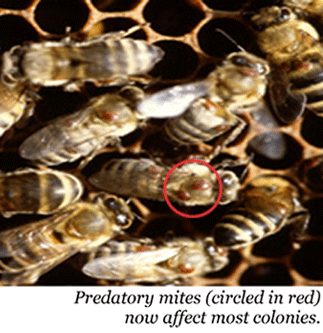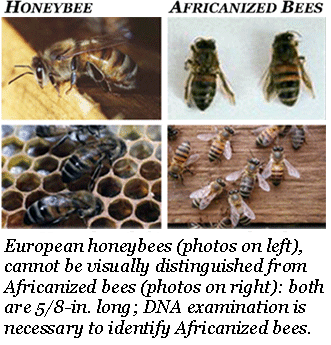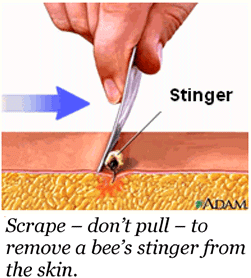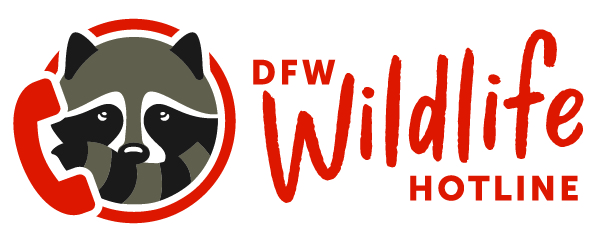Wildlife: Bees – The Breeze, the Trees, the Honeybees Willing Volunteers, All!
Are you experiencing an issue with wildlife in your area? If you have an urgent concern, please get in touch with us right away. If you are looking for more information, please click on one of the questions below to expand the content and find your answer. If you have any additional questions, please don’t hesitate to reach out to our team at DFW Wildlife Coalition.
A Willing Volunteer?
So, what exactly does the amazing honeybee so willingly volunteer to do? For centuries these hard-working insects have been pollinating our crops and flowers, helping to light our world with wax for candles, and sweetening our daily bread with their luscious honey. Today, for the first time, the honeybees’ very existence is threatened. How?

 NOTE: Visual identification of Africanized bees is impossible. DNA testing is the only way to distinguish between Africanized bees and the beneficial European honeybee.
NOTE: Visual identification of Africanized bees is impossible. DNA testing is the only way to distinguish between Africanized bees and the beneficial European honeybee.
- Mysterious diseases such as Colony Collapse Disorder are wiping out whole colonies.
- Predatory mites are attacking bees.
- In Texas and elsewhere, hives are being invaded and slowly taken over by aggressive, Africanized bees, making hive eradication by concerned communities commonplace.

 NOTE: Visual identification of Africanized bees is impossible. DNA testing is the only way to distinguish between Africanized bees and the beneficial European honeybee.
NOTE: Visual identification of Africanized bees is impossible. DNA testing is the only way to distinguish between Africanized bees and the beneficial European honeybee.Why should I care if bees are dying?
The most important role bees play in our world is in pollination of plants. Without bees, up to 70% of our food supply could be affected.
That would mean that not only might we have to do without things like tomatoes, pumpkins and almonds, to name just a few, but many of the grains that are food for our livestock would also fail. A world without bees would most certainly be one in which hunger could become even more an issue of concern than it is today.
That would mean that not only might we have to do without things like tomatoes, pumpkins and almonds, to name just a few, but many of the grains that are food for our livestock would also fail. A world without bees would most certainly be one in which hunger could become even more an issue of concern than it is today.
How can I protect my family?
Yes, I understand that bees are important, but how can I protect my family from stings? Bees are unlikely to attack unless the hive is disturbed.
- Be aware of the location of a hive near you and NEVER hit or disturb the hive.
- Call a humane eviction service to remove any bee colonies that are too near human activity to be safe—inside walls of a house or school, etc.
- Always wear shoes when outside to prevent you from stepping on a bee.
- Wear long pants and long sleeves when outside to guard against all insect stings.
- Avoid wearing perfumes and other sweet-smelling ointments when you are outside.
So, how can I help the bees?
Try to coexist peacefully with our bee neighbors whenever possible—bees die if they must sting to protect themselves and/or the hive.
- Refrain from using pesticides and poisons that may have unintended consequences to other species including humans.
- Teach children to have a proper and healthy respect for bees and their important role in our urban ecosystem without instilling in them unwarranted fear. Help them understand why they should leave bees alone, and give them instructions on what to do if stung.
- If you feel safe doing so, keep a bee box or “skep” in your garden—the bees will thank you by pollinating your flowers, fruit and vegetables and by providing honey.
Safety Tips
For most people, a single bee sting is a minor annoyance with minimal pain, swelling and/or itching at the site of the sting. However, if a person has sustained large numbers of stings or is experiencing symptoms such as difficulty breathing or accelerated pulse rate, it is possible that he/she may be suffering from a systemic allergic reaction. When in doubt, seek medical help.
What to do if you encounter a swarm
- RUN FAST to the nearest enclosed space such as a car or house while covering your eyes and mouth.DO NOT stand still swatting the bees or try to avoid them by jumping into water (the bees will continue stinging you when you come up for air).
- CALL for medical assistance if needed.
- CONTACT a professional beekeeper who can humanely remove the colony to a safer location (call the hotline at 972/234-WILD for referrals).
What to do if you are stung
- GET TO A SAFE PLACE inside a structure.
- USE A CREDIT CARD or other similar material to scrape the stinger out of the skin.
- DO NOT pinch or pull the stinger to remove it (this will pump even more venom into the wound).
- WASH the areas with soap and water to help avoid infection.
- APPLY ICE to help reduce the pain and swelling.
- SEEK MEDICAL HELP immediately if you are experiencing shortness of breath, showing signs of severe allergic reaction or have sustained large numbers of stings.

Last, but certainly not least!
If a hive is located in a home or school where it cannot remain, please call a professional BEEKEEPER, not an exterminator, to humanely remove the colony to another location so the bees can continue to benefit all of us without being a danger to you or your family. Call the DFW Wildlife Coalition Hotline at (972) 234-WILD for a list of beekeepers/organizations that practice humane bee removal and relocation.
With Education and Care, it is possible to live in peace with these industrious and beneficial insects.
With Education and Care, it is possible to live in peace with these industrious and beneficial insects.
Credit to Megan Davis McConnell for writing this article.

